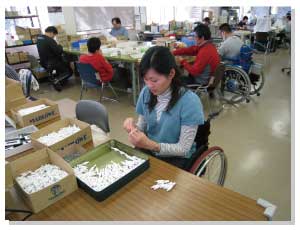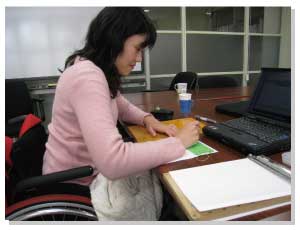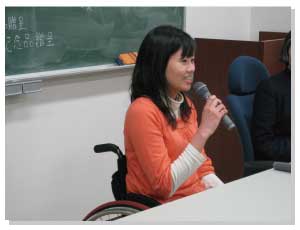- HOME
- Alumni News
- Chen Ying-Ju (10th trainee)
- Ying-Ju's Final Report
Ying-Ju's Final Report
A new discovery--Me
Me before Training
1. The image I had about wheelchairs
In Taiwan, I was always on crutches, because I thought that people would think my disabilities were very severe if I was in a wheelchair. In Japan, I sat in a wheelchair for the first time in my life.
2. Going out on my own
I always had a terrible sense of direction and was always tense because I was worried about getting lost. I was also very anxious when I was on trains, if I was going somewhere I had never been before.
3. On confidence
I never used to express my feeling, and always spoke in a faint voice as I had little confidence.
4. On people with disabilities
Before the training I didn’t know much about people with disabilities in Taiwan, nor did I have much knowledge about people with disabilities in the world.
This was how I was, and who I was, before Duskin Leadership Training.
My training
1. Centers for independent living
I received training at three centers for independent living; Human Care Association, Non Profit Organization Center for Independent Living “Iruka Okinawa”, and Independent Living “Muchu” Center.
Iruka left the strong impression on me. Their training schedule was extremely tight and there were many people—as I was very shy, it was very hard to get used to this environment. The training would go on until 9 or 10pm, I was tired every day and lacking sleeps. There were also many people with severe disabilities visiting the center; at first I did not know where to begin with, what to ask them or what was alright to ask. As I had never had this type of training before, I was often unable to ask questions that I had never even given any thought to before. Many people also assumed that my Japanese was good, so it was especially tough for me not to be able to answer questions properly.
However, when the two weeks were up, I was able to understand much better about how people with severe disabilities used helper services in everyday life, and what their real needs were. For example, I was totally stunned when the ASL person I visited said “I spend 24 hours in bed, but I am happy every day and I have no problems.” The person with muscular dystrophy whom I visited, cooked me an excellent meal with the aid of a helper. These experiences left a strong impression on me; that people can have the lives they want, because there was this helper system.
Through the hard training, part of my shyness was gone. I also got used to the days of training that continued daily until late at night.

2. Traininga at universities
For my individual training, I visited Tsukuba University of Technology, Tsukuba University, and Ritsumeikan University. Tsukuba University of Technology is a university for students with visual or hearing impairments, so they were well equipped with devices and systems to support students. I wanted to know, if, at Tsukuba University—a “regular” university, there was also a support system for students with disabilities, and what the students’ needs were, so I interviewed students with disabilities. I also went to Ritsumeikan University and got associated with post graduate students in various disciplines at Graduate School of Core Ethics and Frontier Sciences.
Of all the things I learned during the training, I would like to focus on the interview result with students with disabilities at Tsukuba University. I would like to choose two out of the many questions in the interview, followed by my analysis.
| Hearing impairment | Visual impairment | Motor impairment | Internal ailments | Total | |
|---|---|---|---|---|---|
| No. of students | 23 | 13 | 12 | 2 | 50 |
| No. of interviewees | 2 | 4 | 3 | 0 | 9 |
This chart shows the number of students with disabilities and the number of interviewees at Tsukuba University in year 2008. In 2008, there were a total of 50 students with disabilities at the university, and I interviewed nine of them. I interviewed two out of 23 students with hearing impairment, 4 out of 13 students with visual impairment, and 3 out of 12 students with motor disabilities.
Below are some of the most frequent answers to a question “did you feel anxious about studying or life at the university before your enrollment?”
| Students with hearing impairment | Students with visual impairment | Students with motor disabilities |
|---|---|---|
|
|
|
This chart shows that the students had many worries and concerns before they started their university life. Students with disabilities would feel a lot more worried if their university offered no support, worried about how they can go about their studies.
The next question was “what do you think would have been a problem if you had not had the support you have now?”
| Students with hearing impairment | Students with visual impairment | Students with motor disabilities |
|---|---|---|
|
|
|
This shows that students with disabilities need support, or they are unable to study. Students with motor disabilities may not need much support for studying, but if they have difficulties with transport, their life and studies can easily be compromised.
In order for students with disabilities to live comfortably and easily, universities need to offer an environment where studies can be facilitated further. The most important thing is to ask what their needs are, and to train many helpers so that a support system can be developed to ensure that these needs are met.
3. Sign language and Braille training
Sign language or Braille was not my main training, but I loved sign language. I wanted to study sign language to communicate much more with Yee Haw or Kasun, so I continued to study sign language during my training period at Tsukuba University. I also studied a bit of Braille, and made Braille bookmarks for Kenzhe and Janki.

Unforgettable memories
I have many unforgettable memories of Japan.
1. Sport
I experienced many types of sport for the first time in Japan. The most unforgettable, was skiing. I also experienced swimming for the first time and developed a love for it. I want to continue swimming after going back to Taiwan.
2. Home stay
I spent the New Year at a Japanese home in Miyazaki Prefecture. I have many foods that I cannot eat, but the host mother gave a lot of thought to cooking and cooked me lovely meals every day, with the foods I liked. They also took me to many places. Even though it was such a short time I had a great time.
3. Trainees
We became great friends. We can be very noisy when together but it is great fun. I have many fun memories of the other trainees, I will never forget them when I go back home.
I have changed!
At the beginning of this report I wrote about “me before the training.” I want to list up the same topics, to illustrate how I changed during this long training period.
1. The image I had about wheelchairs
I love wheelchair! It is not hard work to go shopping if I am in a wheelchair, and I can also carry a lot. I love going out in a wheelchair now.
2. Going outdoors on my own
I am okay going out on my own! Even in new places, I can remember directions a bit better than before.
3. On confidence
I have more confidence. I can calmly state my opinions in a louder voice than before.

4. On people with disabilities
I often think that it is good to be a person with a disability. Whenever I go on a train, I am guided by someone from the railway staff, and they always announce “a customer is being guided” across the platform. These things would have embarrassed me before, but now it makes me feel like I am someone of great importance, and I feel it is good to be someone with a disability.
My objectives after returning to Taiwan
When I go back to Taiwan I want to accomplish the following.
- I would like to create an environment for students with disabilities where they can live and study more easily.
- I would like to create a collaboration system between university departments to support students with disabilities and centers for independent living.
- I would like to convey to people in Taiwan the important of accessibility (barrier-free) and universal design.
Gratitude
I would like to say thank you from the bottom of my heart, to the staff of Duskin AINOWA foundation and Japanese Society for Rehabilitation of Persons with Disabilities, to whom I owe the 10 months’ training. I will also never forget the other trainees. We will go our own ways from now on, but let’s keep working together to create good societies.




